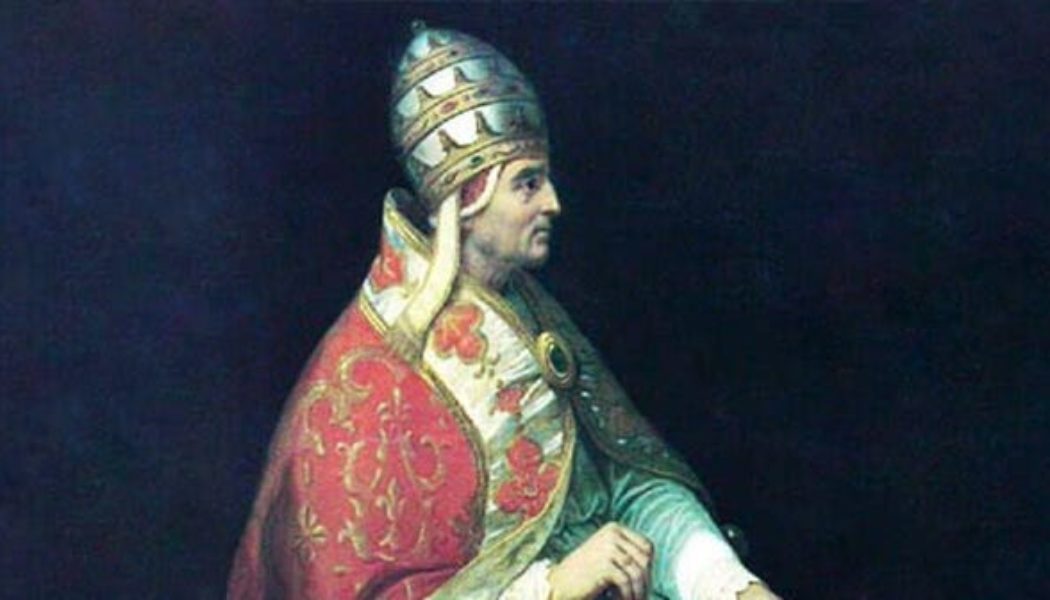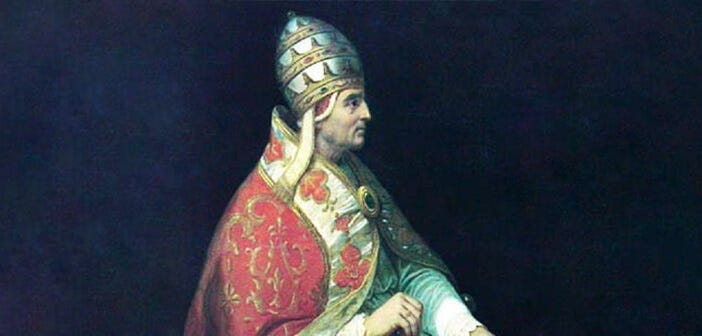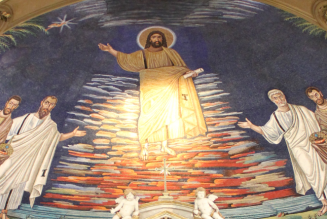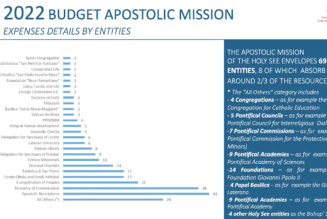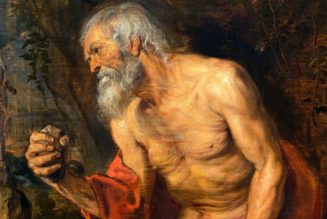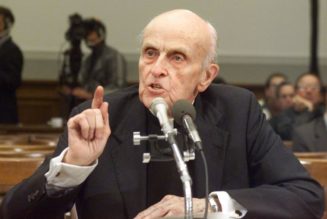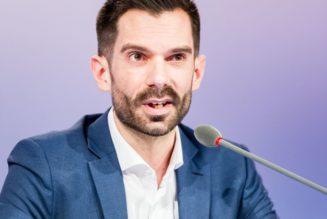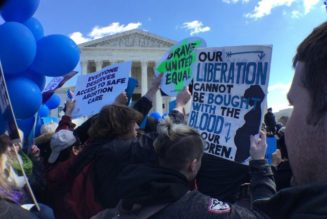Hey everybody,
Well. There’s a lot to talk about today, isn’t there?
Let’s start with Blessed Pope Urban V, whose memorial we celebrate, and who led the Church as pope just a decade before the great “Western Schism” of the 13th and 14th century.
Born Guillaume de Grimoard, he was a Benedictine monk who became a brilliant canon lawyer in the 1300s, and eventually became a critical part of the pope’s diplomatic corps, helping to negotiate the place of the Church in the fractured Italian peninsula.
When Innocent VI died in Avignon in 1362, the Church’s cardinals gathered to elect a successor. They were deadlocked, according to most accounts, with one history even recording that they elected a cardinal candidate who turned down the position.
But eventually, the conclave’s thoughts turned to the Benedictine canonist who had served the Church well in Italy. With the cardinals electing him pope, Fr. Grimoard was ordered to Avignon to “consult” with the conclave.
Only upon arrival did he discover that he had been elected pope, and would need to be consecrated a bishop.
As pontiff, Urban V urged bishops to live in their dioceses and attend to their people — somewhat ironic, of course, since he was a bishop of Rome living in Avignon. He also pushed for episcopal austerity, emphasized the importance of bishops offering Mass in their cathedrals, urged reforms on priestly formation, and gave to the Church the example of a pope who lived in austerity, and continued to follow the Benedictine rule to which he had committed himself.
He founded Catholic universities, helped to renew the monastery at Monte Cassino, and in 1367, became the first pope to set foot in his own Roman diocese in 60 years. He stayed for three years in Rome before returning to Avignon shortly before his death.
Urban had a reputation for a serious and devoted prayer life, for love of the poor, and for selfless love of Christ.
But there is one story, maybe apocryphal, that today stands out to me. I don’t know if it’s true, but I hope that it is.
As the story goes, the early months of 1363 were bitterly cold in France, so much that the Rhone River, alongside the city of Avignon, froze over — this was a very unusual occurrence, as the Rhone almost never freezes entirely during the winter.
But in January 1363, it did get covered in thick ice, and so the people of Avignon got in the practice of crossing it, by foot and even with wagons.
Urban, apparently, had some experience with unreliable ice, and cautioned the city against putting too much weight on the ice. He apparently urged them repeatedly to avoid putting themselves in danger of drowning — especially during a winter when people in Avignon were already dying in cold temperatures.
For Urban this became a little crusade, so to speak. He did not want to see people take risks with their lives, and fall through patches of bad ice, into danger they mightn’t recognize.
So eventually, as the story goes, Urban issued a decree promising a latae sententiae excommunication for those who crossed the ice of the Rhone.
The practice apparently stopped. The pope may well have saved lives among his people.
Urban died on Dec. 19, 1370, and was beatified 500 years later, by Pope Pius IX in 1870,
May he intercede for us all.
The news
Also convicted Saturday were businessmen Raffaele Mincioni and Gianluigi Torzi, former Vatican financial figures Fabrizio Tirabassi and Enrico Crasso, former Vatican financial authorities René Brülhart and Tommaso Di Ruzza, and self-styled security consultant Cecilia “CeCe” Marogna, who has reported acting as a kind of “private spy” for Becciu.
You can read about the verdict here.
The conviction is historic, and a momentous achievement along the still rocky, up-and-down path of financial reform in the Vatican.
It is also a testament to the power of public accountability. In recent months, Vatican experts, Vatican officials, and other journalists have all told me that years of reporting from The Pillar’s Ed Condon has been absolutely instrumental in every stage of this case — that Ed’s investigative reporting contributed directly to the 2021 indictments of these figures, and contributed subsequently to the prosecution’s ability to make a case.
Indeed, Ed has spent years combing through European financial filings and bank records, making phone calls and meeting with sources, to uncover the embezzlement and fraud that was highlighted in the case, and then to help lay out the case systematically and clearly.
Today, his hard work demonstrates that public accountability in the Church can bring about reform — and that it’s good for laity to expect the Church’s leaders to act with justice, transparency, and integrity.
It’s not always welcomed, of course, by all ecclesiastical officials, which is why some threaten us with litigation, including Pillar reader Cardinal Becciu.
But expecting integrity can actually impact the life and direction of the Church.
Thanks be to God for you subscribers, who make that work at The Pillar possible.
—
Ok, so after the verdict on Saturday, Cardinal Becciu said he’d appeal his “absurd” conviction — and you can read about that here.
And if you’re wondering where Vatican-convicted felons like Becciu serve their time, or other questions like that, this report also delves into some of the practical questions about what happens next. If you’re wondering about that, read this.
—
And there is one practical question that the Vatican has not yet answered.
The cardinal does not pay market rate for the apartment, which includes a servants’ wing and a commercial-grade kitchen, and is believed to be one of the largest available in Vatican City.
While his appeals wind through the court, there is word on whether he will be permitted to keep the apartment, which “CeCe” Maragna described as “my paradise” in Facebook posts describing her overnight stays there.
Exodus 90 starts January 1 for tens of thousands of men around the world. Are you tired of returning to the same ‘modern Pharaohs’ over and over again — overconsumption of social media, numbing your problems with alcohol, pornography, or binge-watching TV? Our culture today has no shortage of Pharaohs and idols that hold us back from true unity with God. Exodus 90 offers you a way out.
—
Ok, now listen, readers, I am not a conspiracy theorist at all.
I tend to eschew speculations about grand manipulation or cunning in hierarchical institutions, because I generally expect that people are not sufficiently competent to pull off that kind of thing.
But people given to conspiracy might note the timing of the news cycle this week.
I expected, like a lot of you did, that we would spend almost all of this week reporting on Vatican finances, unpacking the trial, looking at what it might mean for Pope Francis, and asking hard questions about whether the embezzlement proven in court might involve other, unindicted co-conspirators.
We’re not doing a lot of that, at least not yet.
Because like a lot of Catholics, we got a bit sidetracked on Monday.
On Dec. 18, the Dicastery for the Doctrine of the Faith released Fiducia supplicans, a declaration that provided a framework for blessing couples in “irregular”relationships and same-sex unions.
Again, I’m not given to conspiracy theories. But if you are, you’ve probably already noticed that the Vatican has done a pretty good job at moving the trial right out of the headlines.
I’m just saying.
Anyway, on to Fiducia supplicans.
The 5,000 word text offered a broad section on the theology of blessings, which it called a “development” on the subject.
Drawing from that theology, it laid out the conditions in which clerics could offer “spontaneous” blessings to same-sex couples who requested them. It also laid out the conditions under which such blessings could not be offered — namely, according to the text, in any circumstances in which a blessing might be taken as approval of an immoral relationship, or give the appearance of being a wedding ceremony.
If you haven’t read the text, we put together a “cliffs notes” version for you — a reader’s guide to the text of Fiducia supplicans.In short, if you want to understand the thing on its own terms, this is a good place to start.
—
As the headlines unfolded, and we saw the way in which the document has been perceived, we also put together an explainer that aims to answer some common questions on Fiducia supplicans — among them is this question: “Did the pope just permit gay marriage?”
—
We’ve also done some analysis on Fiducia supplicans.
For my part, I took a look yesterday at the two-fold controversy ahead for the Church: In some places, the text of Fiducia supplicans itself will be debated sharply. But in other corners of the Church, Fiducia supplicans will be more important as a symbol than as a text — and the Church may soon see prohibited rites justified as part of the “spirit of Fiducia supplicans.”
Of course, some of those rites, in the spirit of Fiducia supplicans, will be explicitly prohibited by the text itself.
But I don’t think that’s going to matter.
Read about the spirit of Fiducia supplicans, right here.
To my way of thinking, that prospect is a dangerous proposition for the Church.
If the spirit of Fiducia supplicans is allowed to exceed the actual text of the thing — becoming cover for the kind of liturgical blessings already happening in Europe — there will be almost certainly a split among bishops, and a serious one.
It is good to discuss pastoral care for gay Catholics, and to discuss what evangelization should look like among people who identify as LGBT.
But in recent years, the bishops of some European countries have already gone well ahead of the Vatican, defying Vatican mandates, permitting liturgical blessings for gay couples, and daring the Vatican to blink.
Of course, the Vatican has weighed with documents and statements, including Monday’s.
But it has not taken action in a governance sense, intervening authoritatively in dioceses where illicit practices have been permitted or promoted. Recent history suggests the Apostolic See isn’t likely to do that in the immediate future, regardless of the prohibitive components of Fiducia supplicans.
It’s hard to imagine how long that situation can last, especially if Fiducia supplicans becomes the pretext for an increase in the kinds of rites and blessings which the Vatican says are not permitted.
If things continue uninterrupted, it seems likely that eventually bishops from more conservative parts of the world will deem the situation intolerable, and there could be real consequences to that — schisms are not impossible, or unheard of, in the history of the Catholic Church.
If you think my predictions are alarmist, consider that questions regarding homosexuality and pastoral care have split nearly every Western Protestant denomination in recent years, and those splits have been acrimonious, and harmful to souls. It would be a kind of triumphalistic arrogance to imagine the same thing couldn’t — or won’t — happen in the Catholic Church.
Again, if you think I’m being a doomsayer, take a look at the front page of the NY Times website yesterday afternoon:
Two stories: the Church moving forward on a plan that could be used as cover for permissive excess, and the United Methodist Church “breaking up … over LGBTQ policies.”
While all that happens, of course, institutional disaffiliation continues at a blistering pace, with far less attention than the distraction of ideological polemics.
Pray for the unity of the Church.
—
Ed’s analysis took a deep dive into a particular issue that has gone mostly overlooked — the way papal power is construed in Fiducia supplicans.
In an assessment of the text’s theological framing, Ed argued that Cardinal Victor Fernandez’ introduction to Fiducia supplicans “would seem to place the reception of the pope’s personal magisterium on a par with perennial doctrine” — especially by omitting a key phrase of Praedicate Evangeliium.
In Ed’s reading, Fernandez might well be accused of both “metaphorically and literally cutting out the ecclesiology of the council from his presentation of papal teaching.”
If you want to think about Fiducia supplicans from a broader perspective than the issues on its face, this is the analysis to read.
Other news
Outside those stories, here’s one from Friday I don’t want you to miss: The Holy See has ordered the religious community founded by Fr. Marko Rupnik to dissolve by October 2024, after it found “serious problems” related to its governance.
—
And finally, here’s a story that should move us to prayer. The Latin Patriarchate of Jerusalem reported on Dec. 16, Saturday, that an IDF sniper shot two Christian women seeking refuge at Holy Family Parish in Gaza — one of whom was apparently killed as she tried to “carry the other to safety,” said Cardinal Pierbattista Pizzaballa.
The patriarchate reported on the same day that an IDF rocket targeted a Missionaries of Charity convent, home to 54 disabled people, who have now been displaced without the medical equipment they need.
The IDF said it is “reviewing” the “incident,” which allegedly took place when a “threat” was “identified in the area of the church.”
Pray with me for peace in the Holy Land.
Let the earth rejoice
This is my last Pillar Post newsletter before Christmas. It’s perhaps appropriate that it’s filled with so much serious news: the news so often reminds of the need for a savior, to set us free from sin.
But especially as we approach Christmas, I hope you’ll find some time to turn off the news for a while — even The Pillar — to rejoice in the good news that Jesus Christ came into the world to live, die, and conquer death, out of love for each one of us.
His life was to be poured out for us. He was born for that. The wood of the crib prefigures the wood of the cross.
Isaiah put it this way:
“For a child is born to us, a son is given us;
upon his shoulder dominion rests.
They name him Wonder-Counselor, God-Hero,
Father-Forever, Prince of Peace.
His dominion is vast
and forever peaceful.”
Readers, Jesus Christ is the Prince of peace, the God-Hero, the Wonder-Counselor.
His Church is the sacrament of our salvation, it prepares us for the vast and forever peaceful dominion to which the Lord will lead us.
If you read The Pillar, you know that sin is real, and that none of us escapes the disordering and corrupting influence of Satan.
But this Christmas, please remember too that grace is real. That Christ can make us of us saints, that we can share eternity in the blessed life of the Trinity. That’s the story that really matters. It’s the one I most want to tell. We serve the Prince of Peace.
The Lord is king, let the earth rejoice. May we proclaim his justice. May we see his glory.
Merry Christmas.
Please be assured of our prayers, and please pray for us. We need it.
In Christ,
JD Flynn
editor-in-chief
The Pillar
Exodus 90 starts January 1 for tens of thousands of men around the world. Are you tired of returning to the same ‘modern Pharaohs’ over and over again — overconsumption of social media, numbing your problems with alcohol, pornography, or binge-watching TV? Our culture today has no shortage of Pharaohs and idols that hold us back from true unity with God. Exodus 90 offers you a way out.
Comments 37
Services Marketplace – Listings, Bookings & Reviews
